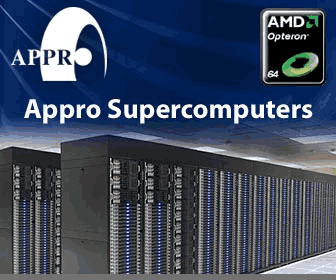AUTOMOTIVE
DataSynapse Launches Latest Release of Its FabricServer Software
 Real-time infrastructure is IT infrastructure that dynamically responds to business demand and enables the timely and cost-effective delivery of new business services. According to Donna Scott, vice president at Gartner Inc., in the “Hype Cycle for IT Operations Management, 2007” report (published June 22, 2007), “Real-time infrastructure has three value propositions expressed as business goals: reduced costs, achieved by better, more-efficient resource usage and by reduced IT operations management costs; improved service levels, achieved by dynamic tuning of IT services; and increased agility, achieved by rapid provisioning of new services or resources and scaling of established services.” The latest release of FabricServer improves the end-to-end user experience for business applications by allocating computing resources based on business demand, business calendar, service level agreements (SLAs) or transactional priority. The 2.5 version contains DataSynapse Studio software, the first developer tool for real-time environments that automates and standardizes the testing, deployment and packaging of enterprise applications. The updated release also provides seamless integration with DataSynapse VersaVision software, the company’s business reporting and analytics platform, which provides visibility into real-time infrastructure and the enterprise applications that run on it. “Dynamic configuration, activation and scaling of enterprise applications will have a dramatic impact on the manner in which organizations manage their data centers,” stated Barry Childe, director, head of High Performance Computing at Barclays Capital. “I believe that IT organizations can be much more proactive going forward in implementing real-time strategies for managing costs and growth.” With the latest version of FabricServer, IT organizations can focus on simplifying application management, application deployment and increase operational efficiency and agility. Business benefits include:
Real-time infrastructure is IT infrastructure that dynamically responds to business demand and enables the timely and cost-effective delivery of new business services. According to Donna Scott, vice president at Gartner Inc., in the “Hype Cycle for IT Operations Management, 2007” report (published June 22, 2007), “Real-time infrastructure has three value propositions expressed as business goals: reduced costs, achieved by better, more-efficient resource usage and by reduced IT operations management costs; improved service levels, achieved by dynamic tuning of IT services; and increased agility, achieved by rapid provisioning of new services or resources and scaling of established services.” The latest release of FabricServer improves the end-to-end user experience for business applications by allocating computing resources based on business demand, business calendar, service level agreements (SLAs) or transactional priority. The 2.5 version contains DataSynapse Studio software, the first developer tool for real-time environments that automates and standardizes the testing, deployment and packaging of enterprise applications. The updated release also provides seamless integration with DataSynapse VersaVision software, the company’s business reporting and analytics platform, which provides visibility into real-time infrastructure and the enterprise applications that run on it. “Dynamic configuration, activation and scaling of enterprise applications will have a dramatic impact on the manner in which organizations manage their data centers,” stated Barry Childe, director, head of High Performance Computing at Barclays Capital. “I believe that IT organizations can be much more proactive going forward in implementing real-time strategies for managing costs and growth.” With the latest version of FabricServer, IT organizations can focus on simplifying application management, application deployment and increase operational efficiency and agility. Business benefits include: - Reduced data center operations costs and growth rates through improved utilization rates of servers in the data center.
- Improved business user experience through allocation of computing resources based on business demand, business calendar, service level agreements or transactional priority.
“With support for the Microsoft .NET Framework 3.0, Internet Information Server and Windows SharePoint Services 3.0 in FabricServer 2.5, DataSynapse is enabling Microsoft’s enterprise customers to better meet business goals by creating an IT infrastructure that continuously adapts to support new applications and capabilities,” said, Dino Chiesa, director in the Connected Systems Division, at Microsoft. The latest release of FabricServer, which will be generally available in Q1 2008, includes the following key new features:
- DataSynapse Studio: A development tool for configuring enterprise applications for a real-time IT environment. Support for Microsoft Application Platforms: Supports .NET Framework 3.0, Internet Information Server and Windows
- SharePoint Services 3.0 alongside existing support for Java, J2EE, Legacy and COTS/ISV applications – many of the technologies in the application portfolio of DataSynapse’s enterprise customers.
- Command-Line Interface: Enables integration with enterprise scripting languages to automate packaging and deployment of enterprise applications.
“If businesses operate in real-time, then so should their IT infrastructures,” said Jamie Bernardin, president, CTO and co-founder, DataSynapse. “Our technology is proven to help customers create real-time environments today. With FabricServer software, DataSynapse has made it dramatically easier for IT organizations to deliver on the promises of on-demand computing, utility computing and shared SOA services.”
